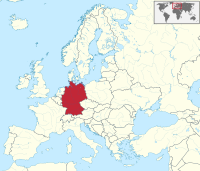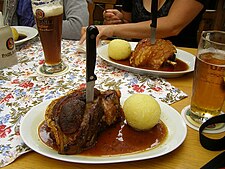Portal:Germany
Welcome to the Germany Portal!
Willkommen im Deutschland-Portal!

|

|

| |
Germany (German: Deutschland), officially the Federal Republic of Germany, is a country in Central and Western Europe, lying between the Baltic and North Seas to the north and the Alps to the south. It borders Denmark to the north, Poland and the Czech Republic to the east, Austria and Switzerland to the south, France to the southwest, and Luxembourg, Belgium and the Netherlands to the west.
Germany includes 16 constituent states, covers an area of 357,578 square kilometres (138,062 sq mi) and has a largely temperate seasonal climate. With 83 million inhabitants, it is the second most populous state of Europe after Russia, the most populous state lying entirely in Europe, as well as the most populous member state of the European Union. Germany is a very decentralized country. Its capital and largest metropolis is Berlin, while Frankfurt serves as its financial capital and has the country's busiest airport.
In 1871, Germany became a nation-state when most of the German states unified into the Prussian-dominated German Empire. After World War I and the Revolution of 1918–19, the empire was replaced by the parliamentary Weimar Republic. The Nazi seizure of power in 1933 led to World War II, and the Holocaust. After the end of World War II in Europe and a period of Allied occupation, two new German states were founded: West Germany, formed from the American, British, and French occupation zones, and East Germany, formed from the western part of the Soviet occupation zone, reduced by the newly established Oder-Neisse line. Following the Revolutions of 1989 that ended communist rule in Central and Eastern Europe, the country was reunified on 3 October 1990.
Today, Germany is a federal parliamentary republic led by a chancellor. It is a great power with a strong economy. The Federal Republic of Germany was a founding member of the European Economic Community in 1957 and the European Union in 1993. Read more...
Selected article

Annelies Marie "Anne" Frank (German: [ˈanə(liːs maˈʁiː) ˈfʁaŋk] , Dutch: [ˌɑnəˈlis maːˈri ˈfrɑŋk, ˈɑnə ˈfrɑŋk] ; 12 June 1929 – c. February or March 1945) was a German-born Jewish girl who kept a diary documenting her life in hiding amid Nazi persecution during the German occupation of the Netherlands. A celebrated diarist, Frank described everyday life from her family's hiding place in an Amsterdam attic. She gained fame posthumously and became one of the most-discussed Jewish victims of the Holocaust with the 1947 publication of The Diary of a Young Girl (originally Het Achterhuis in Dutch, lit. 'the back house'; English: The Secret Annex), which documents her life in hiding from 1942 to 1944. It is one of the world's best-known books and has been the basis for several plays and films.
Frank was born in Frankfurt, Germany, in 1929. In 1934, when she was four-and-a-half, Frank and her family moved to Amsterdam in the Netherlands after Adolf Hitler and the Nazi Party gained control over Germany. By May 1940, the family was trapped in Amsterdam by the German occupation of the Netherlands. Frank lost her German citizenship in 1941 and became stateless. Despite spending most of her life in the Netherlands and being a de facto Dutch national, she never officially became a Dutch citizen. As persecutions of the Jewish population increased in July 1942, the family went into hiding in concealed rooms behind a bookcase in the building where Frank's father, Otto Frank, worked. The hiding place is notably referred to as the "secret annex". Until the family's arrest by the Gestapo on 4 August 1944, Frank kept and regularly wrote in a diary she had received as a birthday present in 1942. (Full article...)
Selected picture
Related portals
- Parent portals
- Regional
- History
 Holy Roman Empire (900–1806)
Holy Roman Empire (900–1806) East Germany (1949–1990)
East Germany (1949–1990)
- Neighbouring countries
Anniversaries for November 23

- 912 – Birth of Otto I, Holy Roman Emperor
- 1943 – Birth of politician Günther Beckstein
- 1991 – Death of actor Klaus Kinski
Did you know...
- ... that Marie Marcks sarcastically caricatured gender roles like no one before, according to Jutta Limbach?* ... that Johann Friedrich Hartknoch published the first edition of Immanuel Kant's Critique of Pure Reason?<!-18 Nov-->
- ... that during the Second World War the British government transmitted German music to Nazi U-boats?
- ... that the Niederdollendorf stone, the Grésin plaque, and the Landelinus buckle are each controversially conjectured to depict a pagan-inspired Jesus Christ?
- ... that Prussian-born Samuel Conrad Schwach founded the first newspaper in Norway in 1763?
- ... that Gerda Philipsborn, a German woman, dedicated her life to the development of Jamia Millia Islamia, a national university in New Delhi?
- ... that a German pastor let a deposed East German head of state stay in his house?
- ... that after Hitler came to power in 1933, the newspaper Hakenkreuzbanner acquired an office building and printing presses by seizing them from a Social Democratic publication?
Selected cuisines, dishes and foods

Schweinshaxe (German pronunciation: [ˈʃvaɪnshaksə] ; literally "swine's hock"), in German cuisine, is a roasted ham hock (or pork knuckle). The ham hock is the end of the pig's leg, just above the ankle and below the meaty ham portion. It is especially popular in Bavaria as Schweinshaxn, pronounced [ˈʃvaɪnshaksn̩] or Sauhax(n) [ˈsao̯haks(n̩)]. A variation of this dish is known in parts of Germany as Eisbein, in which the ham hock is pickled and usually slightly boiled.
Schweinshaxe is one of the formerly typical peasant foods, in which recipes were composed to make inexpensive and tough cuts of meat more palatable (cf. for beef the popular Sauerbraten). Such inexpensive cuts usually require long periods of preparation; the meat is sometimes marinated for days, and in the case of big cuts up to a week. The Schweinshaxe is then roasted at low temperatures, typically—depending on size—for two to three hours. (Full article...)Topics
Categories
Things you can do

A list of articles needing cleanup associated with this project is available. See also the tool's wiki page and the index of WikiProjects.
Here are some tasks you can do. Please remove completed tasks from the list.
- Requests: German Archaeological Institute at Rome, Deutsche Familienversicherung, Dietlof von Arnim-Boitzenburg, Rolf von Bargen, Hennes Bender, Georg Bernhard (1875–1944), Eduard Georg von Bethusy-Huc, Rolf Brandt (1886–1953), Jan Philipp Burgard, Lisa Feller, Georg Arbogast von und zu Franckenstein, Georg Gafron, Ferdinand Heribert von Galen, Gundula Gause, Karl-Heinz Hagen, Herbert Helmrich, Nils von der Heyde, Monty Jacobs (1875–1945), Hans Katzer, Siegfried Kauder, Matze Knop, Wolfgang Kryszohn, Claus Larass, Isidor Levy (1852–1929), Markus Löning, Tobias Mann, Mathias Müller von Blumencron ,Günther Nonnenmacher Anke Plättner, Hans Heinrich X. Fürst von Pless, Gerd Poppe, Victor-Emanuel Preusker, Günter Prinz, Ulrich Reitz, Hans Sauer (inventor), Franz August Schenk von Stauffenberg, Paul Schlesinger (1878-1928),Oscar Schneider, Hajo Schumacher, Otto Theodor von Seydewitz, Christoph Sieber (comedian), Dorothea Siems, Werner Sonne, Anton Stark, Udo zu Stolberg-Wernigerode, Christoph Strässer, Joseph von Utzschneider, Jürgen Wieshoff, Hans Wilhelmi, Dietmar Wischmeyer, Alexandra Würzbach
- Unreferenced: Unreferenced BLPs, Bundesautobahn 93, Benjamin Trinks, Steeler (German band), Amelie Beese, Zoologisches Museum in Kiel, Emil Krebs, Prussian semaphore system, Partenstein, Peter Krieg, Porsche 597, Christa Bauch, Curt Cress, Stefan Beuse
- Cleanup: 53541 issues in total as of 2024-03-03
- Translate: Articles needing translation from German Wikipedia
- Stubs: Albersdorf, Thuringia, Ingo Friedrich, Berndt Seite, Federal Social Court; 118 articles in Category:German MEP stubs
- Update: Deutsches Wörterbuch
- Portal maintenance: Update News, Did you know, announcements and the todo list
- Orphans:
Orphaned articles in Germany

- Photo: Take/Add requested photographs
- Expression error: Unrecognized punctuation character ",".
Associated Wikimedia
The following Wikimedia Foundation sister projects provide more on this subject:
-
Commons
Free media repository -
Wikibooks
Free textbooks and manuals -
Wikidata
Free knowledge base -
Wikinews
Free-content news -
Wikiquote
Collection of quotations -
Wikisource
Free-content library -
Wikiversity
Free learning tools -
Wikivoyage
Free travel guide -
Wiktionary
Dictionary and thesaurus













































